International Relations | 29.10.2007-d.welle
International Relations | 29.10.2007
Ahead of India Visit, Merkel Signals Shift in Asia Policy
German Chancellor Angela Merkel heads to India on Monday, Oct. 29, promising to reverse her government's China-centric Asia policy and expand business and political ties with Delhi.
India may have increasingly been on the radar of successive German governments in recent years, but it's been a mere blip compared to China's overpowering presence. That is likely to change as German Chancellor Angela Merkel heads to Delhi and Mumbai on her first official visit.
Last week, members of Merkel's center-right Christian Democratic Union (CDU) called for a shift in focus of the government's Asia policy, saying there had been an overemphasis on China at the expense of other rising Asian economies.
Berlin's relationship with Beijing is currently strained after China objected to a meeting between Merkel and the exiled Tibetan spiritual leader, the Dalai Lama in September.
"Many chances in a democracy like India"
Germany's policy towards Asia has so far "been too narrowly focused on economic issues and China," said Eckart von Klaeden, foreign policy spokesman for the CDU's parliamentary group, last week in the Bundestag.
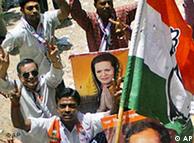 Bildunterschrift: Großansicht des Bildes mit der Bildunterschrift: Merkel's party has stressed India's democratic credentials
Bildunterschrift: Großansicht des Bildes mit der Bildunterschrift: Merkel's party has stressed India's democratic credentials
CDU deputies outlined plans to make relations with Asia a cornerstone of Germany's foreign and security policy in order to ensure that the region's growing economic and political clout does not lead to a decline in German influence. The plan calls for an Asia policy increasingly based on Western values and urges Germany to close ranks with other democratic Asian nations such as India, Japan and South Korea.
Merkel signaled last week she is prepared to reverse her predecessor Gerhard Schröder's policy on Asia. He was criticized for an overt emphasis on cultivating business ties with China and turning a blind eye to its human right violations, and try to expand business and political relations with India.
"We have to act relatively quickly," Merkel said. "As Europeans, we have many chances in a democratic country like India. We just have to get involved."
Business, trade ties gather steam
Experts admit that Germany has been slow to wake up to the opportunities that India, a country of 1.1 billion people with rapid growth rates of around 9 percent a year, has to offer.
"The rise of India has come as a surprise to Germany," said Joachim Beck from the Institute for Asian Studies at the German Institute of Global and Area Studies. "It has been so accustomed to seeing India as poor, as an unstable, multifaceted country. The German government never thought India could become a world power in economic and political terms."
In recent years, Berlin has moved to correct its relative neglect of the rising south Asian power by pursuing bilateral business and trade with Delhi.
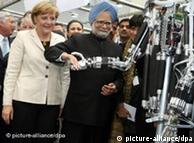 Bildunterschrift: Großansicht des Bildes mit der Bildunterschrift: Merkel with Singh at the Hanover trade fair last year
Bildunterschrift: Großansicht des Bildes mit der Bildunterschrift: Merkel with Singh at the Hanover trade fair last year
India is now Germany's fourth largest trading partner in Asia -- after China, Japan and South Korea. Bilateral trade stands at roughly 10.6 billion euros with German exports to India last year surging by more than 50 percent. Germany is the fourth largest investor in India and newly-confident Indian companies are also increasingly making acquisitions in Europe's largest economy.
Last year's focus on India at the Hanover trade fair as well as the Frankfurt book fair helped in filling the gaps in Germany's image of the Asian nation. Merkel also enjoys good personal relations with her Indian counterpart, Prime Minister Manmohan Singh.
Climate change talks not easy
Despite those improvements, Merkel's visit, which includes economic cooperation, but also climate change and the region's fraught politics, is not expected to be entirely smooth.
On the business front, Merkel's job will be clear cut -- seeking ways to tap what experts say are vast unexplored opportunities in energy and infrastructure among other sectors. A high-profile business delegation accompanying Merkel is expected to use the chancellor's visit to pressure Delhi to tackle familiar problems of overregulation, red tape, corruption, crumbling infrastructure and an unreliable energy supply.
Politically however, Merkel will face complicated talks with Singh, particularly on climate change. Merkel who has taken the lead on tackling the issue in Europe, clinched a deal to halve greenhouse gases at the G8 summit in Germany earlier this year.
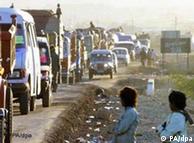 Bildunterschrift: Großansicht des Bildes mit der Bildunterschrift: India emits 4.2 percent of the world's CO2 emissions -- Germany's emits 3.2 percent
Bildunterschrift: Großansicht des Bildes mit der Bildunterschrift: India emits 4.2 percent of the world's CO2 emissions -- Germany's emits 3.2 percent
India, like other developing nations, is vehemently opposed to capping greenhouse gas emissions, saying it will not compromise its continued 9 percent economic growth to arrest global warming. It argues it is historical polluters in the industrialized West who must bear the brunt of emission cuts.
Merkel has welcomed a proposal by Indian leader Singh for an alternative plan that foresees linking caps on carbon dioxide emissions to the population of a country. But, India has since held back on elaborating on the plan, underscoring the divide facing developed and developing nations when they meet in December in Bali, Indonesia to begin negotiations on a new climate change agreement to replace the Kyoto Protocol which expires in 2012.
Bernhard Steinrücke, head of the Indo-German Chamber of Commerce in Mumbai suggested in an interview with Deutsche Welle that Germany should focus instead on what it can offer the Indians in the fight against climate change.
"Compared to Germany, the degree of pollution in India is still very low per capita," Steinrücke said. "German companies have a lot to offer Indians in terms of renewable energy, clean coal technology and energy efficiency know-how."
"Room for Germany as an honest broker"
Merkel will also need to tread carefully on issues such as the conflict in Kashmir and India's relations with neighboring Pakistan, both nuclear powers. Delhi is opposed to critical questions on the topics which it views as international meddling in its internal affairs.
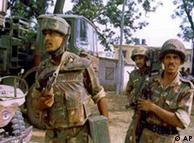 Bildunterschrift: Großansicht des Bildes mit der Bildunterschrift: India doesn't take kindly to international criticism of the Kashmir conflict
Bildunterschrift: Großansicht des Bildes mit der Bildunterschrift: India doesn't take kindly to international criticism of the Kashmir conflict
Other delicate political topics on the agenda include stalled talks on UN reforms and a common desire in Delhi and Berlin for a permanent seat at the UN Security Council, tough German visa procedures for Indian business leaders and a controversial deal on civilian nuclear cooperation between India and the US.
Given that the Indo-US nuclear deal might not materialize in the face of stiff opposition by India's Communist parties, the CDU's von Klaeden hopes there might yet be room for Berlin to gain some political clout in the region.
"The Indians are too clever to only bind themselves to one partner," von Klaeden told the Rheinischer Merkur newspaper last week. "There's lots of room for Germany as an honest broker without a colonial past."
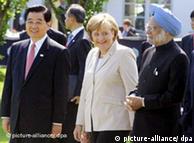
Comments